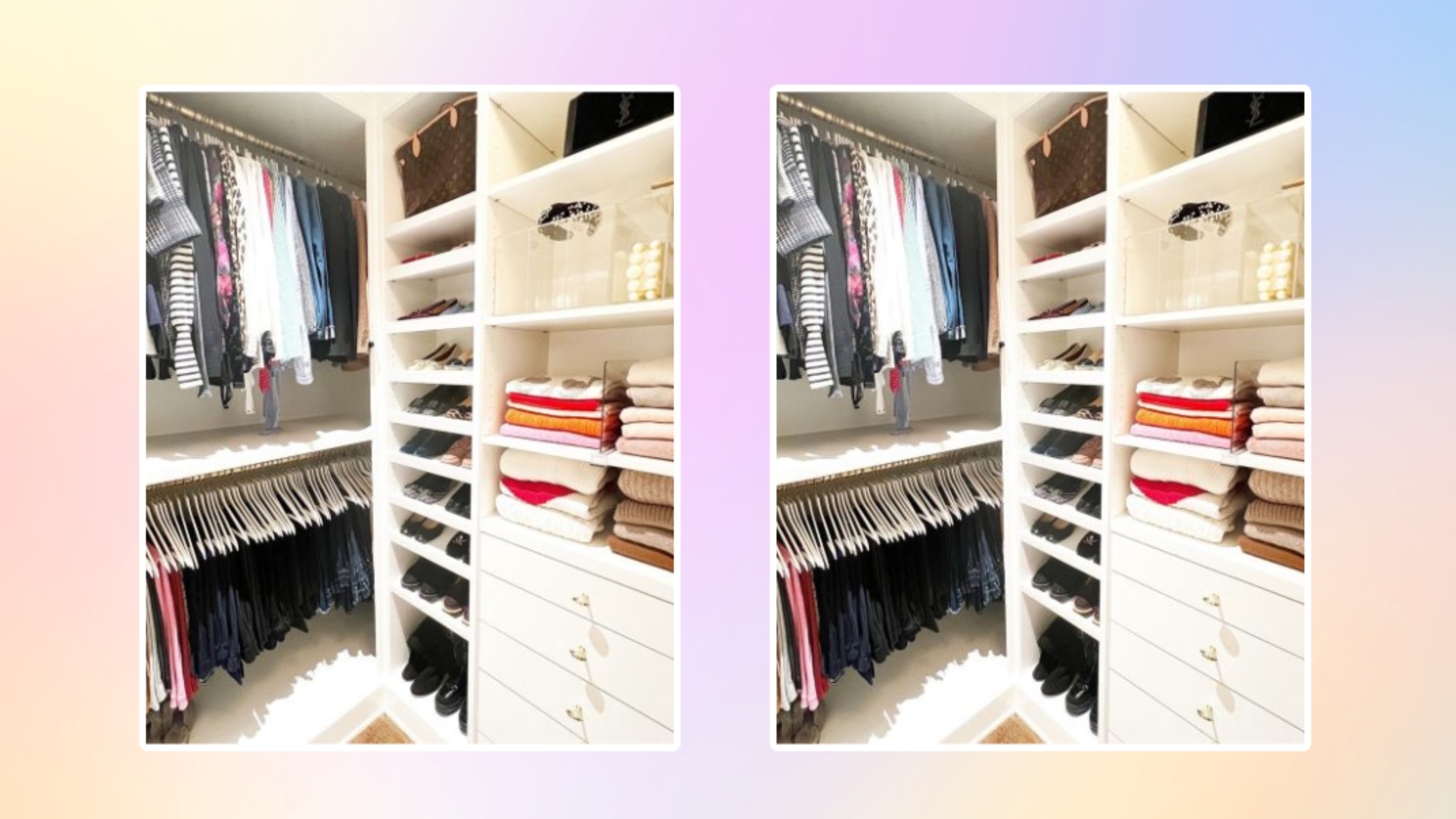How to organize a small closet with lots of clothes
More is more


Overwhelmed by your stacks of crop tops? Can't seem to fish out a single pair of Crocs or Uggs from your closet? If you’ve found yourself spending too much time in the morning stressing about your outfits, some small space organization can help manage the overflow of clothes.
Professional organizer Lisa Jacobs of Imagine It Done in New York, understands that your days get brighter when you have an organized closet. “It is important to have an organized closet for your peace of mind, mental wellness, and day-to-day productivity," says Jacobs.
"With organizational systems, you save time, energy, and dollars. No more wasted moments looking for your favorite slacks and sweaters.”
Consider Minimizing
Even if you’re a style-obsessed shopper with an abundance of clothing you cherish, there are bound to be items that need to be re-homed (or even tossed) lying around your closet space.
“The biggest mistake people make in organizing their closet is to ignore the edit, commonly known as the decluttering process. This is the first and most crucial step for success,” Jacobs says.
Besides, who has time to claw through tons of unorganized clothing just to find an outfit you love? “An organized space is an organized mind and an organized life,” Jacobs explains.
Use Space-Saving Hangers
When reorganizing your closet, it may be tempting to opt for large wooden hangers, like the type you might see at an upscale clothing boutique, but in order to save more space, velvet hangers are always the best option.
Get small space home decor ideas, celeb inspiration, DIY tips and more, straight to your inbox!
Using the same style and color tone of velvet hangers for your clothes will keep a streamlined appeal and the velvet style will also keep delicate clothes intact.
For a more minimalist approach, opt for non-slip black hangers. If you’d like a brighter tone to add more joy to your closet, choose a brighter tone.
“For order, grace, and efficiency, upgrade the hanger. It is unequivocally the number one most important accessory,” Jacobs explains.
Find Other Storage Options
Seasonal clothes, such as hats and jackets, can often be stored elsewhere when not in use. If you’re short on space, try storing these items under your bed in the off-season.
Clear containers are especially helpful for storing away items like rain jackets and gloves as you’ll be able to more easily spot them when they’re needed.
Utilize Shoe Organizers
You’ve stored away your seasonal pieces, you’ve decluttered anything that no longer serves you, and still, you need more room.
If your shoes are scattered around your closet, this might be your chance to create a separate space for those items on a shoe-organizing hanger. This will keep shoes tucked away and all in one place.
Create A Separate Solution For Your Shoes
This is the point in the organization process when you can decide to choose a separate storage option for your shoes. Whether you already have a hanging shoe organizer or stacks of shoe boxes, your shoe collection can take up a ton of space in your closet.
Instead of keeping your shoes with your clothing, you can instead choose to find a separate storage solution such as a stylish shoe rack that can be kept at your doorway entrance.
Try Stacking Outfits Together
Rather than utilizing a single hanger for each piece of clothing, consider hanging full outfits, or clothing you often wear together, on a single hanger. This will free up space in your closet, allowing you to better see which pieces you can wear with new outfits.
Fold Certain Types Of Clothing
The space in your closet might be lacking because you’re hanging clothing that could be folded instead. Items like pants and t-shirts can fit nicely in a dresser drawer, shelf, or basket rather than taking up space in your closet.
If there are shelves at the top of your closet, try and make this area a place where folded clothes can live, which will free up even more room in your closet.
Find The Best Products For Your Closet
Not all small closets are the same shape and size, meaning different products can work better in certain spaces. For closets with taller ceilings, a closet rod expander can help you double up on the amount of clothing you can fit.
More products that Jacobs suggests include labeled bins, drawer dividers, shelf dividers, shelf risers, shoe racks, and even a step ladder.
“These products help you get and stay organized by keeping your stuff contained, visible, tidy, and curated,” she explains.
Organize By Color (Or Type)
Once you’ve decided on how you will organize your closet, it’s time to load everything you want to keep back in. Depending on your style and personal preference, you can decide to organize your clothing by grouping by event, color, or type (for instance, all the pants on the left side).
If bright colors are your jam, try dividing your neutrals and the bright toned items. If you love to dress business for the office and casual on the weekends, consider dividing the two areas of your closet, saving you time in the mornings.
By experimenting with how you choose to group items, you’ll find a solution that works best for your closet and your style.
Reset Your Shopping Mentality
Once everything is said and done, your old jeans are donated, and your closet is finally looking organized, the process doesn’t stop there.
Jacobs advises her clients to soak in everything they have seen in their closets. “When you see your stuff, you don’t carelessly duplicate, which leads to no more impulsive purchases,” she says.
“Order in your home brings on a sense of clarity, serenity, and happiness. It’s as if you have hit reset!”

Hello! I’m Kate Santos, a writer and photographer based in Los Angeles. In the design world, I got my start working as an Editorial Intern for Dwell magazine in San Francisco. Since then, I’ve written about design and architecture in many national magazines and online publications, including Playboy, Hunker, and The Culture Trip.
I grew up in a very old house in North Carolina and am still influenced by the rustic, charming, antique and aged elements of a home. Sustainability and longevity is extremely important to me and I believe learning to reuse materials or purchasing items you’ll love forever goes a long way. I also lean towards the Japanese philosophy of wabi-sabi when designing my own home, embracing the perfectly imperfect items I can find.